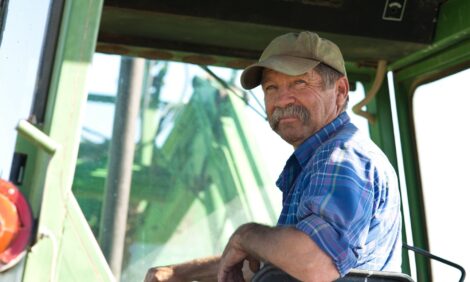



Opinion: US Government food safety system a sham
US - A new federal program for livestock tracking will benefit big corporations, threaten small producers and do nothing to protect consumer health. |
Located south of the tiny town of Tarpley, Texas, Debbie Davis's Seco Valley Ranch is something of a model farm. On her 1,800-acre spread, Davis grazes 225 longhorn cattle, every one of which she closely monitors so that she can better manage the herd and its health. Davis' meat is prized in the supermarkets of Austin and San Antonio, where her grass-fed, pastured beef sells for a premium. In many ways, Davis is the very ideal of a local entrepreneur -- profitable and secure, succeeding on her own terms.
Which is why it angers Davis so much when she considers the government's plans to institute a "National Animal Identification System" that will give a 15-digit tracking number to every cow, chicken, pig, turkey, goat, sheep and horse in the United States to trace animals' every move from birth until slaughter. The federal government and large meat producers are promoting the ID system -- usually referred to by its acronym, "NAIS" -- as a way to better control animal disease outbreaks. But the plan has small and organic ranchers in an uproar. They complain that the animal tracking system will place an undue burden on their operations, giving the biggest meat producers additional economic advantages in an already highly consolidated industry.
"It really does feel like Big Brother," rancher Davis said in a recent interview. "The proposal is that I report every animal I have, every time an animal is born, every time an animal dies, and every time I move an animal from my property. ... There's a lot of expense for everyone. The ones who are going to get impacted are the little guys."
If you're a typical American consumer -- for whom meat usually means supermarket "pink in plastic wrap," not animals out on the range -- then why should you care? Because, say critics of the government's plan, the national livestock tracking system will do nothing to actually prevent animal sicknesses such as mad cow disease or avian flu. According to smaller farmers and sustainable agriculture advocates, the complicated and expensive government proposal is mostly a marketing gimmick. They say the program is simply a way for the largest food corporations to sell more products overseas without addressing some of the key weaknesses in the U.S. food system.
Since the first confirmed case of mad cow disease in 2003, U.S. beef producers have struggled to sell their products abroad. Pork producers fear that a similar market closure could one day hit them if there were an outbreak of, say, swine fever or hoof and mouth disease. The creation of an animal tracking ID system is largely intended, then, to give foreign importers some piece of mind by establishing a way to quickly trace back diseased animals to their source and quarantine that specific herd, while letting the rest of the industry go about business as usual. But the program conspicuously does nothing to address the root causes of livestock disease -- improper diet and a confinement system that encourages epidemics. Instead, say small producers, the proposed plan will simply drop unnecessary costs onto those farmers who are already using best practices.
Source: AlterNet






